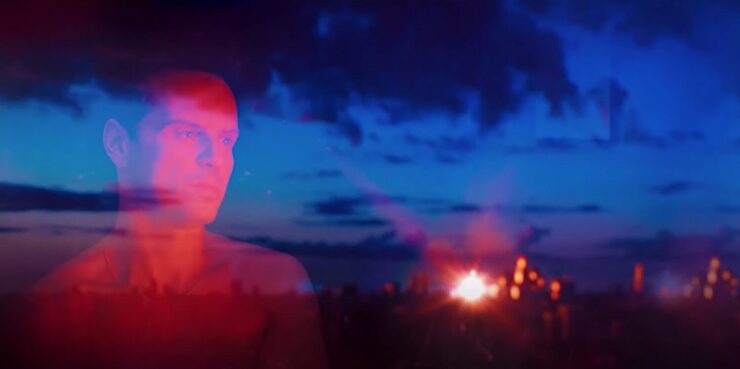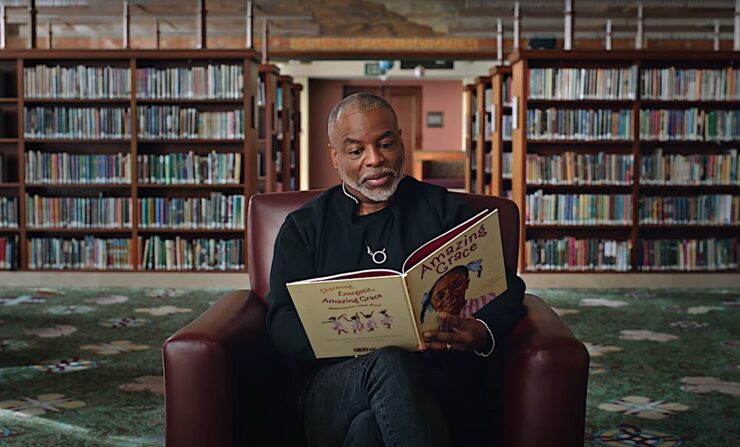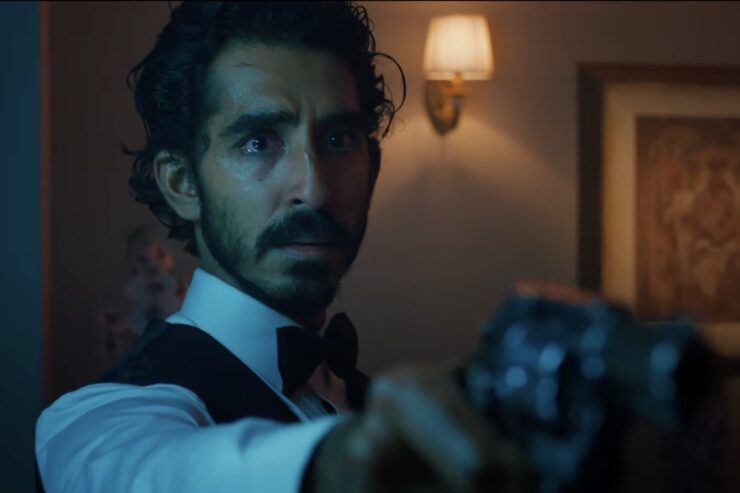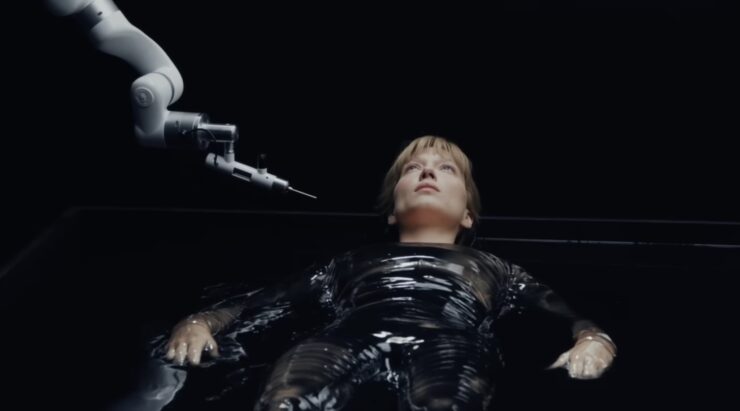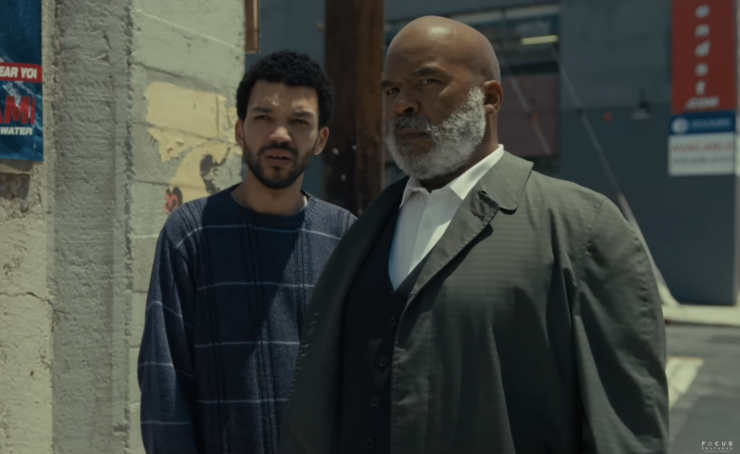I might not be the right person to review All of Us Strangers.
Or maybe I’m the best person?
I… look. I am not strong. What I knew about this movie was that there was a romance between Andrew Scott and Paul Mescal, and that was damn well all I needed to know. I had no idea that the film was a meditation on grief and queerness with some occasional (fantastic) sex scenes scattered throughout. Because of not knowing that, I went in totally cold, I was caught up in a film that creates a delicate, personal tone. Honestly a tone I can best sum up as “gutting.” Trying to write about it feels like trying to pick a butterfly up from a bustling sidewalk without brushing its wings.
If you love film, and what film specifically can express about human nature, you should see All of Us Strangers. If you’re in any kind of pain, you should go see it when you’ll have some free time afterwards to process it.
What the movie is “about” is how when you’re hurt, repeatedly, for being who you are, you never really get over that. The tension and terror always lives inside you, whether you look directly at it or no.
The film is deeply, deeply gay, and by that I mean that if you were bullied at all—and I think most of us were—you’ll find moments to empathize with, but if you’re queer this movie might put you back in how it felt to be a queer child. Especially if you’re old enough that the word “queer” feels even more dangerous and off-putting than “gay”.
It’s also deeply gay because half of the film is about Adam (Andrew Scott) and Harry (Paul Mescal) hooking up, and then realizing that the hook-up might turn into a relationship. I admit that after years of fairly sexless films, it was startling to be in a darkened theater full of strangers watching people negotiate desire. I’ve missed it? The particular nuances and human behavior that sex can bring out in film.
So that’s one half of the film. The other is about Adam’s grief over his parents. They died suddenly when he was 12, and now he’s trying (and largely failing) to write an autobiographical screenplay. Doing that requires him to dive into dark memories of being a queer kid in 1980s suburban England.

From here I’ll try to talk about the plot without spoiling anything that will mess up your experience of the film, but this movie’s kind of impossible to talk about without spoiling at least a few things, so if you want to go in completely cold, duck out now with my extremely enthusiastic recommendation that you go to this beautiful, beautiful movie.
From here on out there are slight spoilers—it shouldn’t hurt your viewing experience, but proceed with caution!
***
This is a stealth specfic movie! That’s also a conversation about grief! Can anyone ever really get over anything? Can you ever really process the loss of your parents, the loss of your childhood, the slow loss of hopes and plans you had before you went out into the world? Maybe the best you can do is put all of that pain into a box, and lock the box, and keep moving. Maybe when you lose your parents, whether through death or rejection, that hurt is always with you—it’s part of you even once you get past the stage of thinking about it constantly. All of Us Strangers tried to wrestle with that, with ghosts!
Another thing I didn’t know when I went to the movie.
When Adam returns to his childhood home to rekindle some memories, he’s met by his parents, just as they were when they died in 1987. They know they’re dead, they recognize their son immediately, and want to know everything about him and the life they didn’t get to see him live. He goes back home again and again, looking through his old room (a time capsule of his mid-80s boyhood), having tea with his mum, reminiscing about setting up the Christmas tree with his dad. Some of these moments are shot through with deadpan humor, but a lot of it is, obviously, heartwrenching.

When he goes back to his flat, he tends to his deepening relationship with Harry. He’s a gay man pushing 50—he came of age in the shadow of AIDs, in a society that only started accepting queerness—grudgingly, kind of—when he was already out of college. Harry, meanwhile, wasn’t even born until after that. Even if his own family treats him like an outsider (as it seems they do, which fucking sucks of them) he at least grew up in a society that treated him as a human being with rights, where most decent people are horrified by homophobia. He’s comfortable with his queerness, he’s comfortable in clubs, he doesn’t seem to have the constant fear of either gay-bashing or illness that Adam can’t shake off.
The two men discuss this divide at length, to the point that Adam’s version of queerness becomes almost a ghost of its own.
What’s interesting to me is that All of Us Strangers is an adaptation of Strangers, a Japanese novel by Taichi Yamada, and its subsequent film adaptation, The Discarnates. I haven’t read the novel, or seen the earlier adaptation yet, but from what I’ve read of them they seem to be straight-ahead horror stories, about ghosts that feed on humans and sap their energy for life.
Andrew Haigh’s movie goes in a different direction entirely. While there is a concern that Adam is letting his time with his ghost parents overwhelm his life, they’re never malevolent—they want him to live. And then the movie goes in a whole other direction that I won’t spoil here. It reminded me of a movie I recently watched called The Keeping Hours. A couple played by Carrie Coon and Lee Pace break up after their young son dies. Years later, the father comes back to clean out their old house and sell it… until he sees his son’s ghost running around in the attic. The movie also uses a (seemingly objectively real) ghost to help its characters process grief, but The Keeping Hours leans into haunted house tropes far more than All of Us Strangers. Where The Keeping Hours uses dark corners and creaking doors to turn a lovely home into a haunted house, All of Us Strangers uses an empty, echoing apartment block to show us Adam’s feelings of alienation—before we even get to the bit with his parents. And then his childhood home is an impossible tangle of nostalgia and regret, every cheesy poster and Christmas ornament a landmine to be stepped around.

But All of Us Strangers somehow embraces those emotions, and turns them into a movie that feels at times, like a soap bubble blown by a tiny child, and at others like a bubble in a foam party.
If you’ve lost people, what would you ask them if you got another day or two with them? What would you want them to know about your life without them? Would seeing them become a trap, a pocket universe to lose yourself in, or would it show you how far you’ve come?










